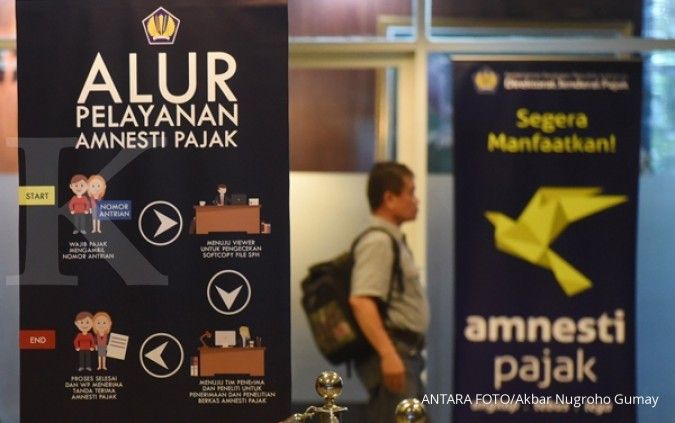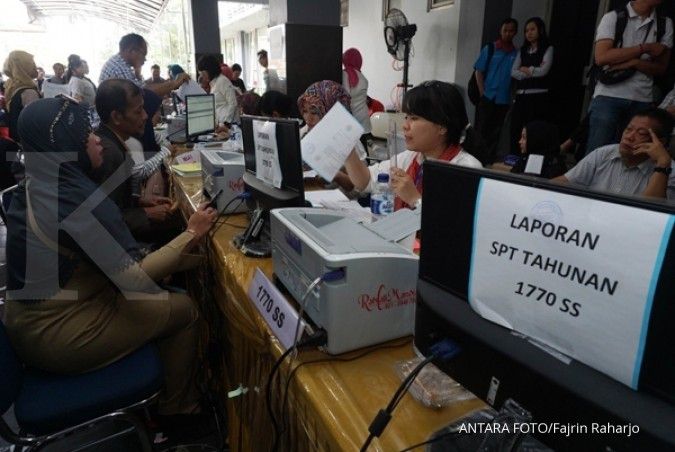JAKARTA. The government’s enforcement of tax return form (SPT) scrutiny has led to mounting complaints, particularly from working married women, as many have fallen victim to contradictory legal interpretations in regard to their tax filings.
The tax office received about 9.01 million SPTs as of Saturday, a 9 percent increase from 8.6 million in 2016, according to Directorate General of Taxation data.
However, the increased enforcement as part of the ongoing tax reform — after the ninemonth tax amnesty, has led to severe penalties for working women who make innocent errors in their SPT filing.
Having failed to input her SPT through the online platform, Lisa, 44, a marketing officer, was initially requested to do the filing manually at the tax office. But later tax officials ordered her to pay Rp 26 million (US$1,950) due to a “tax underpayment” they had uncovered.
“They said that I should have made a joint [SPT] filing with my husband, as specified in the 2008 Income Tax [PPh] Law. I protested because my previous tax filings were always fine and I have never been informed about that rule,” Lisa told The Jakarta Post on Sunday.
The problem lies in the contradictory interpretation of Article 8 of the PPh Law and Article 2 of the General Taxation System (KUP) Law. Paragraph 1 of Article 8 of the PPh Law stipulates that the income of a married woman is considered part of her husband’s earnings if she works for a separate employer.
The single-income consideration is not applicable if they decide to split their assets and incomes under a prenuptial agreement, or if the wife wishes to exercise her own tax rights and obligations, as stipulated in paragraphs 2 and 3 of the article.
Meanwhile, Paragraph 1 of Article 2 of the KUP Law stipulates that all taxpayers who meet requirements set by the laws should register for a tax number (NPWP). This also applies to married women even if they have arrangements with their husbands to split assets and incomes.
“The tax officials argued that the errors in my tax filings in the past were probably passed over. But with more tax officials employed [as part of tax reform efforts], he was sure such omissions were less likely to occur in the future,” Lisa said.
Aulia, 30, a private auditor, said she still held a separate NPWP from her husband and had yet to receive any warning from the tax office. Because of the material consequences, she preferred to keep her problem below the radar.
“I could go to the tax office with my husband and talk about an income-separation plan. But, we’d have to pay more than Rp 8 million in tax underpayments. Thus, I’ve chosen to declare myself as a ‘single’ tax payer,” Aulia told the Post.
The regulations director at the taxation office, Yunirwansyah, said women working for an employer, in accordance to the PPh Law, could keep their own NPWPs and separately file SPTs without incurring any material consequences if they could provide a prenuptial agreement on asset and income separation.
“Without it, the working wife still can have her own NPWP and pay her own taxes, but the tax office needs to merge her income with her husband’s first to calculate the income tax, because a family is regarded as a unified economic unit in the law,” he told the Post.
As a consequence, he said, progressive taxation would be levied on the combined net incomes of the two NPWP holders and each was required to pay tax at proportional rates, leading to underpayments from the income tax that employers had deducted from the wife’s monthly salary.
Tax expert from the Center for Taxation Analysis Yustinus Prastowo called for the tax office to revise the contradictory laws on career women’s NPWPs as part of the tax-reform agenda. “In international practice, both joint and separate filings pay the same level of tax,” he said.
The Directorate General of Taxation’s revenue and compliance director, Yon Arsal, said the tax office had not yet retrieved details on the number of SPTs filed by working women, as it would take further research.
Govt urged to revise contradictory laws on working women’s NPWPs Tax penalties await women with separate NPWPs but united assets.
Since the government’s flagship tax amnesty concluded last Friday, Indonesia now faces a mountain of challenges in reforming the country’s directorates general responsible for generating state revenue amid weak public compliance.
The government launched in December last year tax reform teams for the Taxation Directorate General as well as Customs and Excise Directorate General as part of its efforts to improve state revenue collection in the long run.
The move was important because the tax amnesty program only had a short life span of nine months.
The two teams — chaired by Finance Minister Sri Mulyani Indrawati — consist of directors, advisors, observers, journalists and other members with various mandates to reform the two government bodies that are responsible for Rp 1.75 quadrillion (US$131.34 billion) of state revenue in 2017.
The teams held on Monday their second plenary meeting at the Finance Ministry’s headquarters to report to the minister on their work progress and upcoming short-term plans after the tax amnesty, particularly to secure this year’s revenues by improving services and boosting law enforcement.
The government claimed that the reform teams had completed 11 improvements, or “quick wins,” at both directorates general during the first quarter of the year, including on employee integrity and synergy between the two institutions.
On IT systems, the officials have now implemented onlinebased mechanisms for almost all of their services and business processes.
Both directorates general have also merged their customs identity number (NIK) and tax identification number (NPWP) systems into a “single identity and business profile,” which enables exporters and importers to access customs services using only their NPWPs.
Sri Mulyani said all of the measures taken by the reform teams aimed at creating win-win solutions for the government, taxpayers, exporters and importers.
“We want to create a culture of compliance by improving the precision of our work without creating uncertainty for the business world. On the other hand, good business players have the right to be served well,” she said in a press conference.
The tax reform team, however, still has a great deal of homework to improve the tax database and the tax office’s internal procedures by managing business processes and dealing with recalcitrant taxpayers. One major task is to ensure that a regulation prohibiting tax officials from meeting taxpayers outside of the tax office is fully implemented. The government issued such a measure after recent bribery cases allegedly involving officials at both directorates general.
Meanwhile, Indonesian Employers Association’s (Apindo) advisory board member Sofjan Wanandi pointed out the need for government institutions to reduce policy inconsistencies and strengthen coordination with each other.
“We have discussed with the finance minister eliminating things that often confuse people and affect confidence [in the government],” he said, citing a recent policy flip-flop on the requirement for banks to submit credit card transaction data to the tax office.
The requirement was later annulled.
Bloomberg reported on Monday that Indonesia may be a step closer to winning a much-coveted investment grade from S&P Global Ratings after the tax amnesty ended.
“It’s imminent that Indonesia will gets back its investmentgrade rating,” said Gundy Cahyadi, an economist at DBS in Singapore.
“There has been significant improvement made on all fronts. The broadening of the tax base is going to be a plus in terms of how we look at the overall fiscal standing,” he added.
Richard Noonan, a spokesman for S&P, however, declined to comment on the tax amnesty.
The company in January said it might upgrade Indonesia to investment grade in 2017 or 2018 if the country delivered better spending, ensured that deficits were on a declining trend, and moderated government debt. (Anton Hermansyah, Grace D. Amianti and Farida Susanty)
/2017/03/31/336839050p.jpg)











